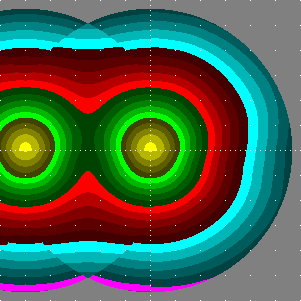


|

|
| In the left half of the left plot, specific illuminance by a continuous row of luminaires spaced 5 heights is shown (right half is for a single luminaire). | The right plot is for a single luminaire, unrotated. |

Values below the scale are illuminance / 1 lx. This is for (unrealistic) “unit” case that luminaires would have lamps producing 1 klm only, would be point-like and just 1 m over the terrain.
# [MANUFAC] .hess
# [TEST] NO45-20R
# [LUMINAIRE] NOVARA SL
# [LUMCAT] 12.02613.0
# [DATE] 23.12.03/07.04.1997/fg |23.12.03 LUMCat
# down given: 100%
# out given: 55.7%
# tilt: 0.0
# [LAMP] TC-L 24W
# Source file: ldt/N4520rai.ldt
# Luminaire flux = 548 raw, for the given bulb(s) it would be 1974 lm,
# 54.8 % of the bulb flux
# between 75 and 90: 0.0 % of the luminaire flux
# - this part causes just GLARE in case of road lighting and similar purposes
# 80deg and above: max 12.2 cd / 1000 lm , 0.1 % of the luminaire flux
# 90deg and above: max 0.8?cd / 1000 lm , 0.0?% of the luminaire flux
# CutOff Type: CIE_CutOff
# Increase of Sky Luminance due to light going
# from the luminaire difectly above horizon, as compared with the
# luminance produced by the light dispersed from the ground: 0?%
# Increase of Sky Luminance in Distant Places by light below 15.0 degrees
# due to light going from the luminaire directly above horizon: 0?%
# (for the zenith luminance such an angle suits places up to 19 km distance)
# The increases concern the following situation:
# Albedo = 0.10
# Zenith Extinction = 0.30 mag (i.e., direct light remaining 76 %)
# Indicatrix type =0 (0: acc. to P.Cinzano, 4..6: CIE sky types)
# (the downward-scattered part of lambertian uplight is 0.1108 then)
# 62.5 deg to <67.5 deg: max -99 cd / 1000 lm,
# 67.5 deg to < 76 deg: max 57 cd / 1000 lm,
# maximum spec. lum. intensity 235 cd / 1000 lm
# The following table gives luminous intensities which would be produced
# using a hypothetic bulb giving a luminous flux of 1000 lm (i.e., cd/klm):
# H: 0.0 10.0 20.0 30.0 40.0 50.0 60.0 70.0 80.0 90.0 100.0 110.0 120.0 130.0 140.0 150.0 160.0 170.0 180.0
#V:
0.0 211 211 211 211 211 211 211 211 211 211 211 211 211 211 211 211 211 211 211
10.0 235 232 233 233 230 228 225 225 229 224 203 196 190 187 183 180 178 176 174
20.0 235 233 232 230 226 221 218 216 215 208 189 181 175 172 167 164 161 158 158
30.0 222 220 216 212 210 204 198 195 192 185 165 157 152 148 143 141 138 138 137
40.0 197 195 192 187 183 174 170 166 161 153 138 130 125 121 122 125 127 127 127
50.0 155 154 153 150 147 140 134 129 122 114 103 97.2 94.7 99.1 101 102 102 101 100
60.0 108 108 108 105 102 97.3 94.0 88.4 80.3 73.5 65.0 63.5 67.9 69.3 70.4 71.8 70.9 68.3 67.5
70.0 53.8 54.2 56.6 57.4 55.6 52.3 49.6 46.6 40.2 34.7 30.9 33.5 36.0 37.2 36.0 35.4 34.4 33.3 33.5
80.0 7.8 7.8 8.8 9.3 10.3 11.3 12.2 11.4 9.0 6.9 7.3 8.5 8.6 7.9 7.2 6.3 5.4 4.8 4.4
90.0 0.4 0.4 0.4 0.4 0.4 0.4 0.4 0.4 0.8 0.7 0.4 0.4 0.4 0.4 0.4 0.5 0.6 0.6 0.6